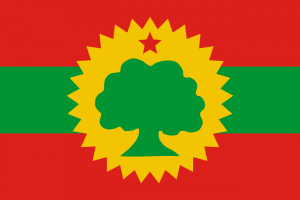Language/Borana-arsi-guji-oromo/Vocabulary/Fruits
Hi Borana-Arsi-Guji Oromo learners! 😊
In this lesson, we will be learning the names of fruits in Borana-Arsi-Guji Oromo. By expanding our vocabulary, we can communicate more effectively in a variety of situations. Plus, learning about new fruits can be interesting and fun! So let's get started. Don't forget that you can also use Polyglot Club to find native speakers and ask them any questions!
Fruits in Borana-Arsi-Guji Oromo[edit | edit source]
Let's take a look at some common fruits in Borana-Arsi-Guji Oromo, along with their pronunciations and English translations.
| Borana-Arsi-Guji Oromo | Pronunciation | English Translation |
|---|---|---|
| Anano | a-na-no | Pineapple |
| Baayi | ba-a-yi | Avocado |
| Badiima | ba-di-ma | Watermelon |
| Fawwaltoo | faw-wa-ltoo | Strawberry |
| Gabiitee | ga-bii-tee | Guava |
| Gadammii | ga-da-mii | Pomegranate |
| Habloo | ha-bloo | Apple |
| Hanqalloo | ha-nqa-lloo | Peach |
| Kiijibaa | kii-jiba-a | Grapefruit |
| Kormooraa | kor-moor-aa | Blueberry |
| Lammiilee | lam-mii-lee | Lemon |
| Looqii | loo-qii | Mango |
| Mokko | mok-ko | Banana |
| Nuufxiinnaan | nuuf-xiin-naan | Clementine |
| Olaanaa | o-laa-naa | Orange |
| Qoronnaa | qor-on-naa | Raspberry |
| Sannoqaa | san-no-qaa | Fig |
Some of these fruits may be familiar to you, while others such as anano (pineapple) and gadammii (pomegranate) may be new. If you are not sure how to pronounce a word, don't hesitate to ask someone who speaks Borana-Arsi-Guji Oromo or consult Omniglot's Oromo page.
Dialogue: At the Fruit Market[edit | edit source]
To get a better sense of how these fruits are used in context, let's take a look at a dialogue between a vendor and a customer at a fruit market. Pay attention to the words in bold to see how they are used.
- Vendor: Kormooraa bira osoo haa galtine? ("Would you like to buy some blueberries?")
- Customer: Namni barbaachisoo sirba koo haa galta? ("Can you sing a song for me about blueberries before I buy them?")
- Vendor: Aadaa fi afaanii boonni koo ganna 42 tahu, lammaffaa koo nyaachisoo. ("This berry has 42 anthocyanin compounds, which makes it beneficial for the body. It is sour.")
- Customer: Waaqayyo ilma namaa mormii haa qabne, yoo du’aan namni barbaachisa koo haa galta. ("Thanks for the info, I'll take those blueberries. Also, can you sing that song for me now?")
- Vendor: "Barbaachisaa, barbaachisaa, nammi kormooraa, yoo sa’a nubaasee raawwatee, lammiilee koo nyaatee." ("I sing, I sing, about blueberries, they are best eaten in the morning, with lemon.")
As we can see in this dialogue, the vendor provides some interesting information about the fruit, and the customer is interested in learning more. Practicing dialogues like this can be helpful in improving our speaking skills, as well as learning new vocabulary.
Fun Fact[edit | edit source]
Did you know that bananas, mokko in Borana-Arsi-Guji Oromo, are technically berries? Berries are defined as fruits that have seeds enclosed in fleshy fruit, and bananas fit that definition. 🍌
Conclusion[edit | edit source]
By learning the names of fruits in Borana-Arsi-Guji Oromo, we can communicate more effectively in a variety of situations. We hope that you found this lesson informative and interesting. Continue to expand your Borana-Arsi-Guji Oromo vocabulary by reading more texts or talking to native speakers. Don't forget to practice your speaking skills with dialogues like the one provided above. Thanks for learning with us! 😄
➡ If you have any questions, please ask them in the comments section below.
➡ Feel free to edit this wiki page if you think it can be improved. 😎
Sources[edit | edit source]
Now that you've completed this lesson, don't stop learning! Check out these related topics: Days of the Week & Geography.

